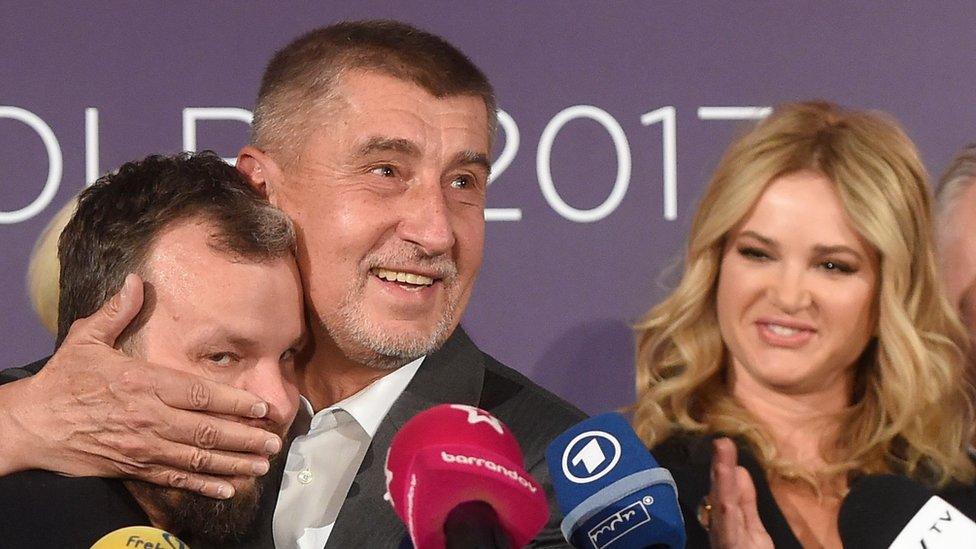Czech election: The politically incorrect president dividing a nation
- Published
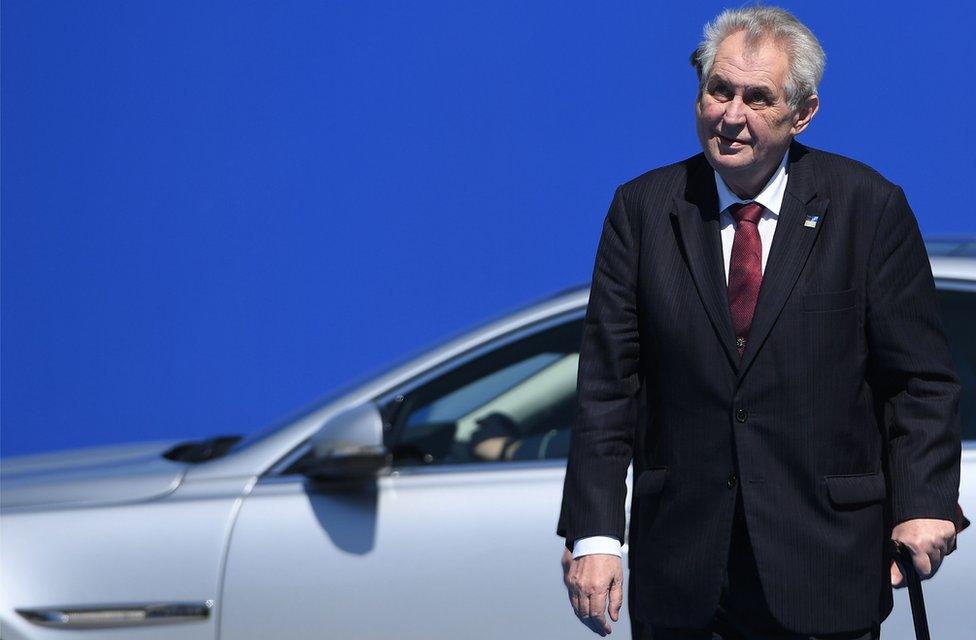
Some voters have cited President Zeman's health problems as a concern
Czechs go to the polls this weekend in the first round of a presidential election. The two-day vote is being seen as a referendum on the outspoken 73-year-old incumbent Milos Zeman, and the direction of the country.
One of Milos Zeman's first acts as president was highly symbolic.
On 3 April 2013, a month after his election, Mr Zeman watched as the blue and yellow EU flag was raised over Prague Castle, seat of the Czech president - something his predecessor Vaclav Klaus had staunchly refused to do.
The act went some way to reassuring at least some of the urban, liberal, pro-European Czechs - most of whom did not vote for him - that the country's geopolitical position would, perhaps, be secure in his hands after all.
That reassurance did not last long. Today the country is split like never before over President Zeman and where his true loyalties lie.
Outspoken
For most of the candidates vying to replace him in the upcoming presidential election, restating the Czech Republic's Western orientation is high on the agenda.
"Prague Castle needs to be fumigated," Michal Horacek, music producer, betting agency entrepreneur and now candidate for president, told the BBC.
"I want the castle to be like a shop window, a bright light of transparency for this country."
President Zeman has become one of the EU's most outspoken opponents of sanctions against Moscow, with his political ally - newly appointed Prime Minister Andrej Babis - echoing his view.
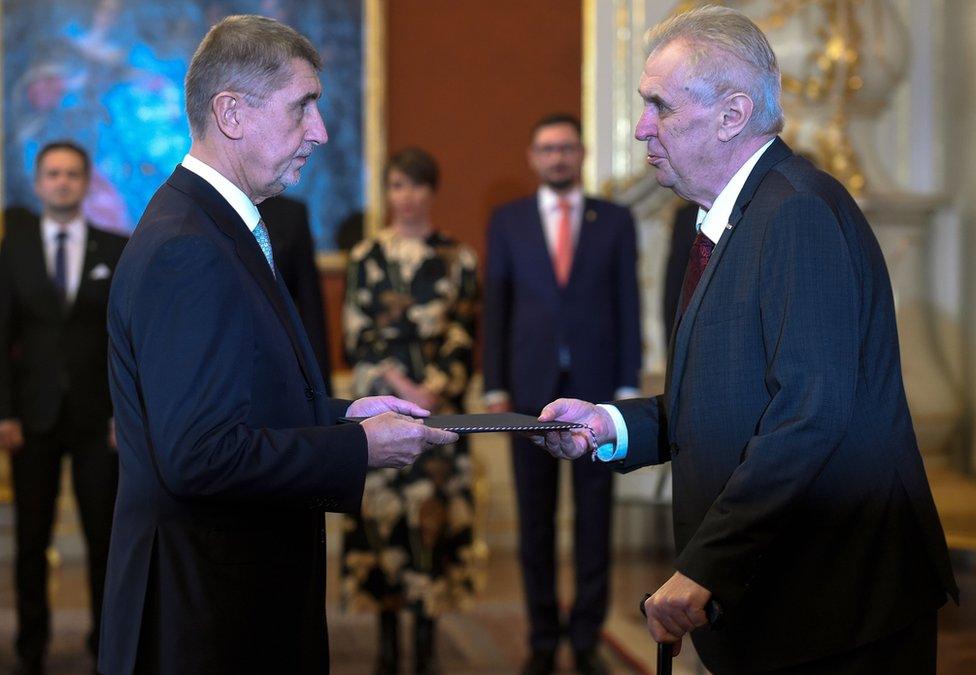
Mr Zeman (R) and Andrej Babis, the newly appointed prime minister and a political ally
His coterie of close advisers include the founder of a Czech subsidiary of Russian oil giant Lukoil.
The president also made improving relations with Beijing a priority, hosting the Chinese president in a lavish state visit.
It is not something that everyone in the country sees as beneficial.
Read more about the Czech Republic
"I don't want the Czech Republic to become a Trojan horse for entities like the Russian Federation and China," Mr Horacek says.
President Zeman's most serious challenger - the former head of the Czech Academy of Sciences, Jiri Drahos - is no less blunt.

Also running for president: Mirek Topolanek (L), Jiri Drahos and Pavel Fischer
"We say in Czech that 'the fish stinks from the head' and that perfectly sums up Mr Zeman's term," he says.
"He has damaged our standing internationally, he has alienated key economic and security partners, he has cheapened the public discourse and increasingly he is indulging extremists."
On these two last points - perhaps here more than anywhere else - Milos Zeman divides the nation.
'Embarrassed'
To his supporters he is a plain-speaking, politically incorrect master of the witty one-liner; a chain-smoking, heavy-drinking politician of the old school; a president who speaks to the hopes and fears of the little man.
Certainly his bon mots, as he calls them, are infamous.
In 2015, he warned the townspeople of Zlin in South Moravia against an invasion of Muslim migrants. "The beauty of our women will be lost," he told the crowd, "because they'll be shrouded in burkas."
"Mind you," he added, "I can think of some women for whom that would be an improvement."
In fact he has made the "threat" from the Islamic world - which he calls an "anti-civilisation" - a central theme of his presidency.
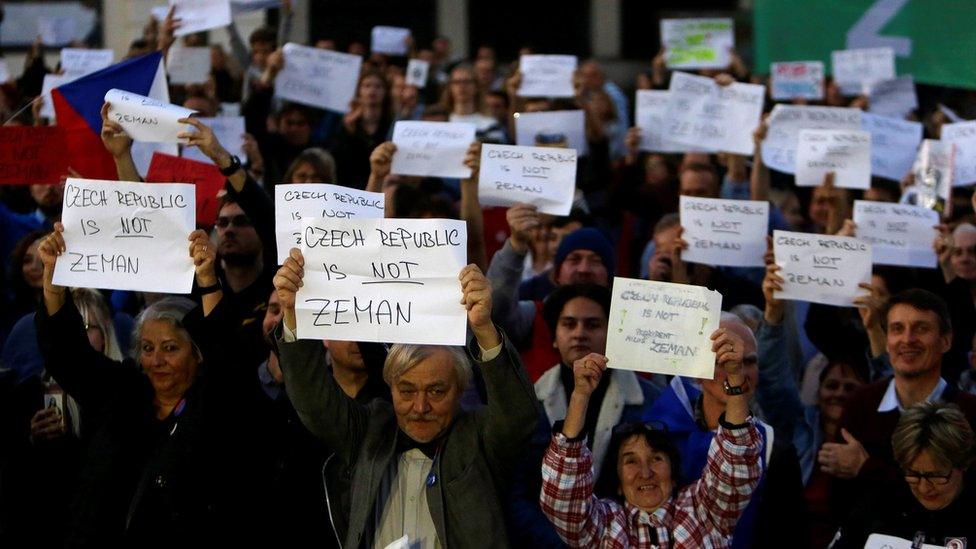
Demonstrators gathered in October demanding Mr Zeman resign
In November 2015, he appeared on stage alongside a raggle-taggle group of Islamophobes and ultra-nationalists. Two years later, he was the keynote speaker at a conference of the anti-immigrant SPD party. It was an unprecedented appearance for a man who calls himself a leftist.
First-time voter Klara - who turns 18 on the second day of polling - would like to see a change of direction.
"I think President Zeman doesn't represent the country as well as he should," she told the BBC. "Sometimes he behaves like he's not our president, and I'm embarrassed."
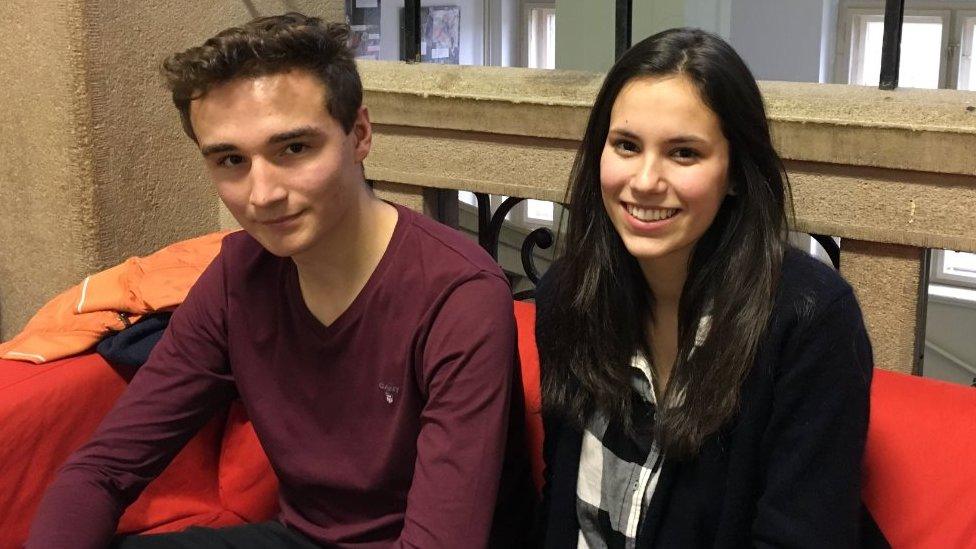
First-time voter Klara (R) said she would like to see a change of direction in the country
The student, who attends a secondary school in Prague, also said Mr Zeman's health problems were a concern. Suffering from type 2 diabetes and related nerve damage to his big toe, he is barely able to walk during public appearances, and leans heavily on a cane.
Posters defaced
But first-time voters in Prague's academic secondary schools are hardly Mr Zeman's demographic.
Upon election, he promised to be the president of the "bottom 10 million". The Czech population is currently about 10.6 million.
It was a clear snub to the country's urban elite.
The feeling is mutual. Virtually every one of the Zeman posters tied to the lampposts in my district of Prague has now been torn or defaced.
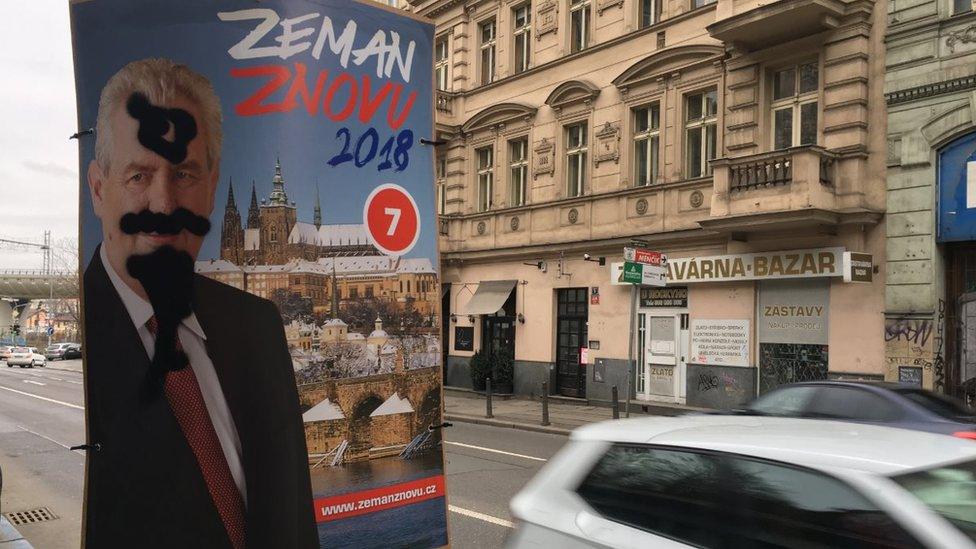
A defaced poster of Mr Zeman in the capital, Prague
However, in cities like Ostrava or Zlin or his native Kolin - especially amongst older, less well-educated voters - things are very different.
If the opinion polls and betting odds are to be believed, they are ready to re-elect him. If that happens, there will be rejoicing in village pubs, while the urbanites will sink into a deep depression.
But if one of his rivals can unseat him, it will represent a major departure for Czech politics as the country marks its 25th birthday.
- Published7 December 2017
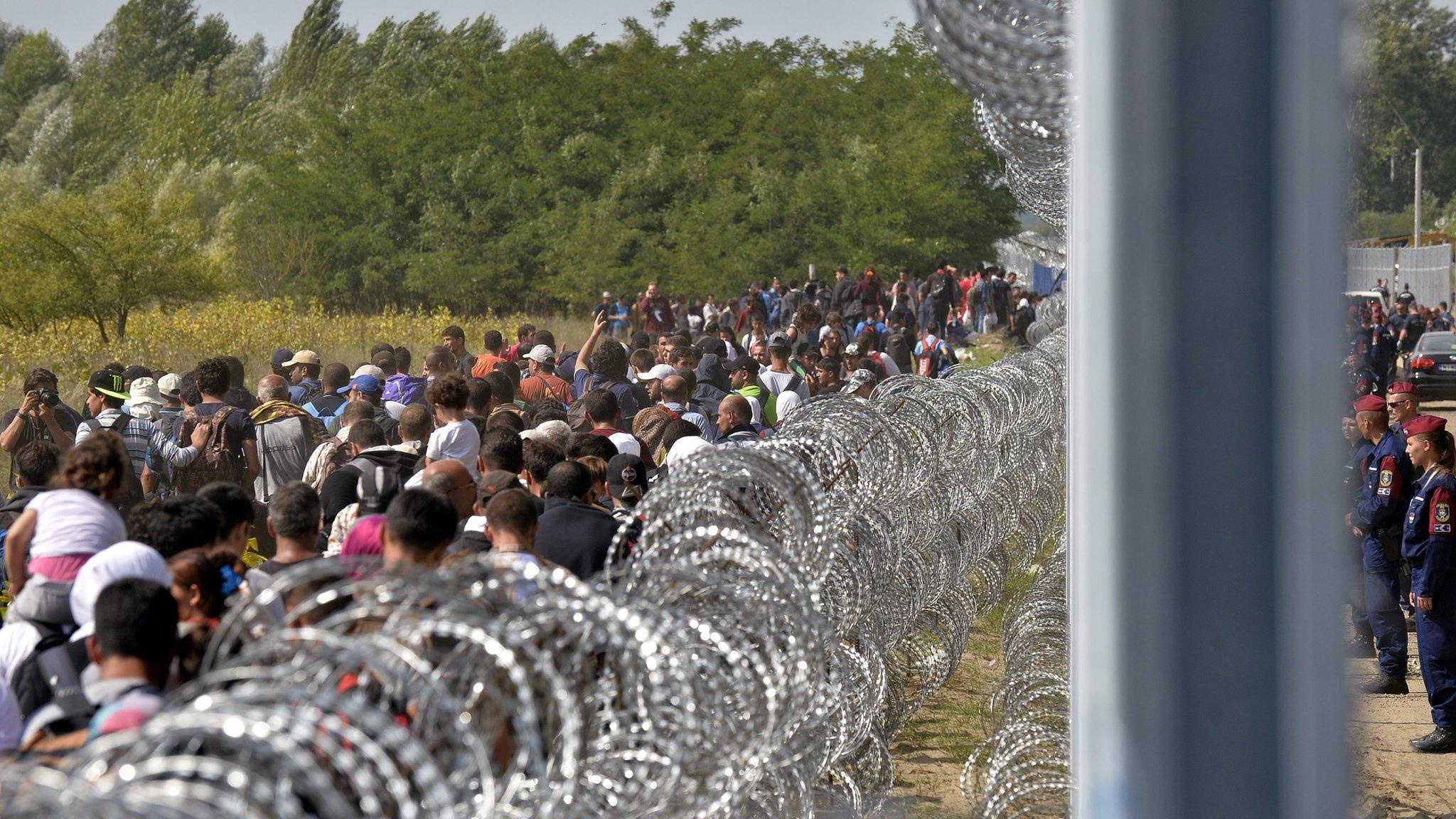
- Published13 June 2017
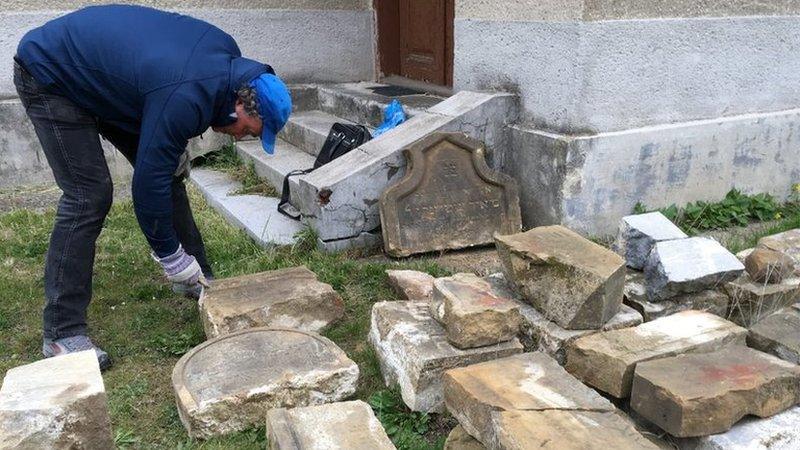
- Published22 October 2017
